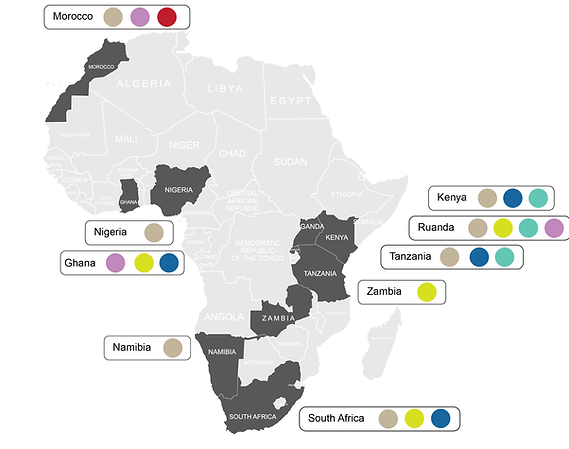Projects in Africa

SOLUTIONSplus is an international flagship project to support the global transition to sustainable mobility. In the context of the EU-funded SOLUTIONSplus project 45 partners and over 100 associated partners work together on transformative change towards sustainable urban mobility through innovative and integrated electric mobility solutions. The team of local authorities, knowledge and finance partners, industry, networks and international organizations will help boosting the availability of public and shared electric vehicles, foster the efficiency of operations and support the integration of different types of e-mobility in urban areas that meet the needs users and local conditions in Europe, Asia, Africa and Latin America.
Smart Energy Solutions for Africa (SESA) is a collaborative project between the European Union and nine African countries (Ghana, Kenya, Malawi, Morocco, Namibia, Nigeria, Rwanda, South Africa and Tanzania ) that aims at providing energy access technologies and business models that are easily replicable and generate local opportunities for economic development and social cohesion in Africa. Through several local living labs, it is expected to facilitate the co-development of scalable and replicable energy access innovations, to be tested, validated, and later replicated throughout the African continent. These solutions will include decentralised renewables (solar photovoltaics), innovative energy storage systems including the use of second-life electric vehicle batteries, smart micro grids, waste-to-energy systems (biomass to biogas), climate-proofing, resilience and adaptation, and rural internet access.
The TRANS-SAFE project will involve national, regional, and city-level demonstrations to test different types of innovative and integrated Safe System solutions, complemented by a comprehensive toolbox, capacity development, policy support and replication activities. To maximize impact, the project brings together a consortium of highly committed cities, road safety agencies and experts from both Europe and Africa.
About BOOST
This project will be a collaborative effort between the GIZ’s Special Initiative on Training and Job Creation and the Urban Electric Mobility Initiative towards unlocking local job creation potentials in a co-development effort with local actors. Partnerships with local entrepreneurs, industry and technical experts will be created to initiate new or improved business concepts that contribute to the local economy, create jobs and foster sustainable development and climate action. Partnerships include the regional platform for electric mobility for Africa, co-hosted by SOLUTIONSplus and UNEP, partner universities of the UN-Habitat Urban Living Lab Collaborating Center, and start-ups involved in the SOLUTIONSplus and SESA projects. Linkages to local educational institutions and vocational training institutions will be made to create an ecosystem for change to ensure the knowledge and skills transfer is embedded to foster further replication. The following section summarizes the key activities and deliverables of this collaborative project.
The Urban Pathways project made an active contribution to delivering on the Paris Agreement at the city level in the context of the New Urban Agenda and the Sustainable Development Goals. It makes a direct contribution to sustainable urban development by focusing on implementation projects in the areas of mobility, energy, and resource management. The project is funded be the International Climate Initiative (IKI) of the German Federal Ministry for the Environment, Nature Conservation and Nuclear Safety (BMU) and is implemented by UN-Habitat, the Wuppertal Institute and UN Environment. Urban Pathways started in four pilot countries (India, Brazil, Kenya and Vietnam) to develop a Living Lab framework, which is then intended to be replicated across the partner regions. Urban Pathways is active in 10 pilot cities and replicating activities in more than 15 cities.
Decarbonising Transport in Emerging Economies
The DTEE project supports transport decarbonisation in Argentina, Azerbaijan, India and Morocco. It is designing a common assessment framework for transport emissions that will cover several transport sub-sectors and transport modes. Country-specific modelling tools and policy scenarios will help the participating governments to implement ambitious CO2-reduction initiatives for their transport sectors. Stakeholder workshops, training sessions, briefings for policy makers and mitigation action plans will stimulate further research and the development of policies beyond the duration of the project.
Transport is a major enabler of economic development. But it is also a major contributor to greenhouse gas emissions. Transport accounted for 30% of CO2 emissions in OECD countries in 2016. In non-OECD countries it contributed only 16%. But transport emissions in the OECD are expected to decrease by 1% annually through to 2030, according to ITF estimates. In non-OECD countries they will grow by 2%. This is mostly because transport demand there grows significantly faster. Estimates see transport volumes in non-OECD countries grow more than twice as fast as in the OECD with 4% annual growth for passenger and 5% for freight transport.

